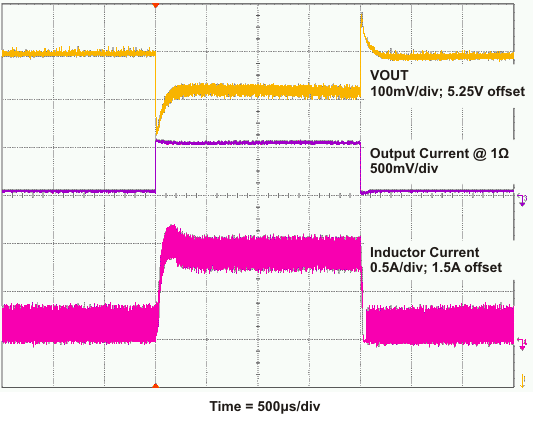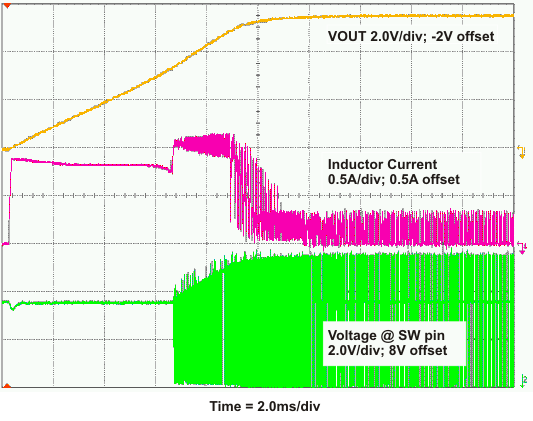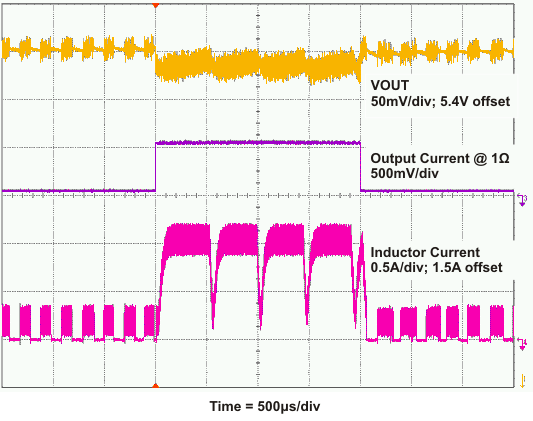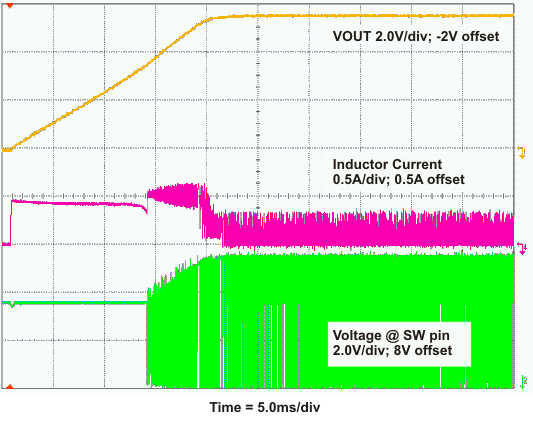SLVSAF7C September 2010 – April 2019 TPS61251
PRODUCTION DATA.
- 1 Features
- 2 Applications
- 3 Description
- 4 Revision History
- 5 Description (Continued)
- 6 Device Options
- 7 Pin Configuration and Functions
- 8 Specifications
- 9 Detailed Description
- 10Application and Implementation
- 11Power Supply Recommendations
- 12Layout
- 13Device and Documentation Support
- 14Mechanical, Packaging, and Orderable Information
10.2.3 Application Curves
Table 4. Table Of Graphs
| DESCRIPTION | FIGURE | |
|---|---|---|
| Waveforms | Load transient response (Tantal Capacitor 2.3 mF with >60 mΩ ESR, VOUT = 5.5 V, VIN = 3.6 V, ILIM = 1000 mA, Load change from 50 mA to 550 mA) | Figure 7 |
| Load transient response (6 × 330-uF Polymer Tantal <5 mΩ ESR in total, VOUT = 5.5 V, VIN = 3.6 V, ILIM = 1000 mA, Load change from 500 mA to 1500 mA) | Figure 8 | |
| Start-up after enable (VOUT = 5.5 V, VIN = 3.6 V, ILIM = 1000 mA) | Figure 9 | |
| Start-up after enable (VOUT = 5.5 V, VIN = 3.6 V, ILIM = 500 mA) | Figure 10 |
SPACE




Table 5 lists the components used for the waveform measurements.
Table 5. List Of Components
| REFERENCE | DESCRIPTION | MANUFACTURER |
|---|---|---|
| U1 | TPS61251 | Texas Instruments |
| L1 | 1 μH, 2.1 A, 27 mΩ, 2.8 mm × 2.8 mm × 1.5 mm | DEM2815C, TOKO |
| C1 | 1 × 4.7 μF, 10 V, 0805, X7R ceramic | GRM21BR71A475KA73, Murata |
| C2 | 1 × 1000 pF, 50 V, 0603, COG ceramic | GRM1885C1H102JA01B, Murata |
| C3 | 1 × 4.7 μF, 10 V, 0805, X7R ceramic | GRM21BR71A475KA73, Murata |
| C4 | 20 × 100 uF, 6.3 V, 1206, X5R | GRM31CR60J107ME39B, Murata |
| R1 | Depending on the output voltage of TPS61251, 1% (all waveform measurements with 5.5 V output voltage uses 1000 kΩ) | |
| R2 | Depending on the output voltage of TPS61251, 1% (all waveform measurements with 5 V output voltage uses 280 kΩ) | |
| R3 | Depending on the input current limit of TPS61251, 1% | |
| R4 | 1 MΩ, 1% | any |